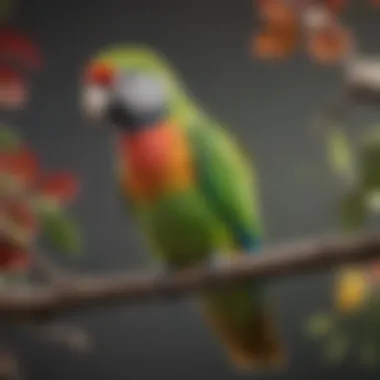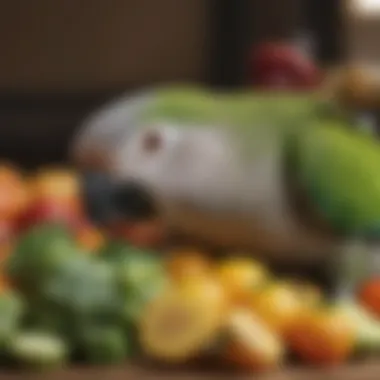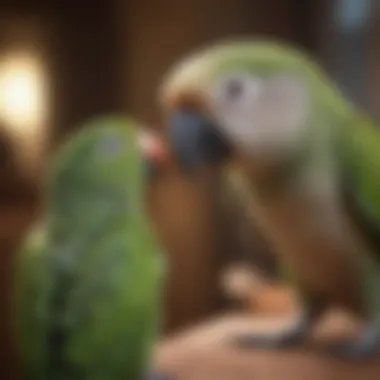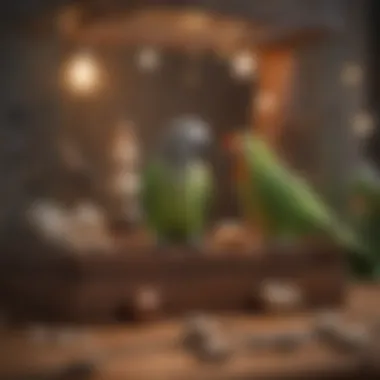Understanding Quaker Parrots: Care and Insights from PetSmart


Intro
Quaker parrots, also known as Monk parakeets, are captivating companions. Their lively personalities and vibrant plumage make them a popular choice among pet owners. Understanding their needs is vital, especially when considering acquiring one from a retailer like PetSmart. This article provides a detailed look into the traits, care, and unique requirements of Quaker parrots, ensuring you are well-prepared for this rewarding journey.
Understanding Your Pet
Pet Behavior Basics
Quaker parrots are known for their inquisitive nature. They are intelligent and curious, often seeking interaction and stimulation. Their social demeanor makes them excellent companions for families or individuals who are willing to engage with them regularly. Understanding their behaviors, such as mimicry and vocalization, is essential for creating a harmonious environment.
Common Breed Characteristics
These birds come in various color mutations, such as green, blue, and yellow. Their size ranges from about 10 to 12 inches in length. Quakers are generally friendly and can form strong bonds with their owners. They are also known for their playful antics, making them entertaining to watch.
Species-Specific Needs
Quaker parrots thrive in environments that cater to their social needs. They require ample communication and interaction with their human caregivers. Additionally, providing appropriate habitats with ample space for movement is crucial. The right balance of socialization, mental stimulation, and enrichement is key for their overall well-being.
Pet Care and Maintenance
Feeding Guidelines
A balanced diet is essential. Quaker parrots benefit from a mix of seeds, pellets, fresh fruits, and vegetables. Avoid feeding them avocado, chocolate, and caffeine, as these can be harmful. It's important to research specific dietary needs helped by the resources at Wikipedia or Britannica.
Grooming Essentials
Regular grooming, including nail trimming and beak care, is necessary. Quakers require occasional baths to maintain their feather health. Engaging them with gentle handling can make this process easier.
Hygiene Practices
Maintaining a clean habitat is vital. Regularly change the bedding and clean food and water containers. This keeps their environment healthy and reduces the risk of illness.
Training and Development
Basic Commands and Skills
Training Quaker parrots can be rewarding. Start with basic commands like
Preface to Quaker Parrots
Quaker parrots, also known as Monk Parakeets, are small, intelligent birds known for their engaging personalities. Understanding these creatures is essential for anyone considering them as pets. Their unique needs, behaviors, and social habits make them fascinating companions but also present specific responsibilities for potential owners.
Overview of the Species
Quaker parrots belong to the family Psittacidae and are native to South America. They are small, typically measuring about 10 inches in length. Their vibrant green feathers and distinguishing greyish breast make them easily identifiable. Quakers are particularly known for their playful demeanor and ability to mimic human speech. This vocal talent contributes to their popularity as pets, as they can be quite chatty and entertaining. They exhibit strong social structures, often forming close bonds with their human companions. Understanding their behavioral characteristics is crucial for ensuring that these birds thrive in a home environment.
Origin and Habitat
The natural habitat of Quaker parrots includes regions of Argentina, Bolivia, Paraguay, and Uruguay. They thrive in subtropical areas and are often found in scrublands, forests, and even urban environments. As a species, they are quite adaptable, which has helped them establish populations in various parts of North America and Europe. In the wild, they build large, communal nests made of twigs and other plant materials, showcasing their strong social nature. This nesting behavior reflects their need for community and interaction, emphasizing the importance of socialization in captivity.
Quaker parrots are recognized not only for their engaging personalities but also for their remarkable intelligence. They require mental stimulation and social interaction to thrive in a household setting.
Behavioral Traits


Understanding the behavioral traits of Quaker parrots is crucial for anyone considering this intelligent and sociable species as a pet. These behaviors influence their interactions with humans and other pets, shaping the overall experience of ownership. Learning about their unique needs also helps in establishing a comfortable environment.
Social Interaction
Quaker parrots are highly social animals. They thrive in the company of others, whether that be humans or other birds. It's essential to engage with them regularly to prevent loneliness and stress. These birds often develop bonds with their owners, displaying affectionate behaviors such as preening and vocalizing in response to interaction.
To foster a strong relationship, regular positive interaction is key. Consider creating a daily routine that includes talking to your parrot and allowing them time outside their cage. This interaction helps build trust and encourages your Quaker parrot to display its playful nature.
Key points to consider regarding social interaction include:
- Daily interaction reduces anxiety.
- Socialization with other birds can enrich their lives.
- Positive reinforcement works well when training and bonding.
Vocalization Patterns
Vocalization is a significant aspect of a Quaker parrot's behavior. They are known for their diverse sound repertoire, which can range from chatty chattering to more complex mimicry of human speech. Understanding their vocalization can provide insights into their mood and health. For instance, excessive screaming may indicate distress or boredom, whereas cheerful chirping usually denotes a happy, engaged bird.
A Quaker parrot's vocal habits can serve multiple functions:
- Communication with owners or other birds.
- Sign of happiness or contentment.
- Expression of discomfort or unease in certain situations.
Being attuned to these vocal patterns allows owners to respond promptly when their pet needs attention or care.
Intelligence and Training Capabilities
Known for their high intelligence, Quaker parrots are capable of learning tricks and commands. This intelligence requires an owner who is patient and willing to invest time in training. Engaging these birds in mental challenges not only helps to harness their skills but also enhances their overall well-being. They can quickly learn simple commands, enrich their environments with toys or puzzles, and even learn to mimic words and phrases.
Training can direct their energy into desirable behaviors, which results in a well-adjusted bird. Consider the following when training your Quaker parrot:
- Use positive reinforcement, such as treats and praise.
- Be consistent in commands and expectations.
- Incorporate play to keep lessons engaging.
In summary, understanding the behavioral traits of Quaker parrots is fundamentally tied to their happiness and health. By prioritizing social interaction, being aware of their vocalization patterns, and committing to their training needs, pet owners can ensure a fulfilling life for their Quaker parrot.
Choosing a Quaker Parrot at PetSmart
Choosing a Quaker parrot is a significant decision that requires thoughtful consideration. By selecting a pet from PetSmart, potential owners can benefit from a wide range of resources that facilitate a successful adoption process. PetSmart often features staff members who are knowledgeable about various bird species, including Quaker parrots. This enables prospective owners to gather crucial information and gain actionable insights about their future pet.
Selecting a Healthy Bird
When visiting PetSmart, the health of your future Quaker parrot should be a top priority. Look for vibrant feathers, clear eyes, and an alert demeanor. An ideal bird will also be active and curious, indicating good health. Potential owners should ask staff about the bird's feeding habits and any previous health concerns. Additionally, inspect the bird's environment for cleanliness. A healthy Quaker parrot is more likely to adapt well to a new home. It's also wise to see if the bird is interacting positively with others, as socialization can be a good indicator of overall wellness.
Understanding Pricing and Options
Pricing can vary based on several factors at PetSmart. Understanding these costs helps owners make informed decisions. Quaker parrots can be relatively affordable compared to other parrot species, but remember to factor in long-term expenses. These include food, toys, and veterinary care. PetSmart generally provides various options for initial purchases, such as starter kits that can help new owners get the essentials needed for their new pet. Inquire about any special promotions or discounts, as they can provide further savings.
Initial Interaction with the Bird
Once you select a potential Quaker parrot, initial interaction is crucial. Approach the bird calmly to avoid stressing it. Allow the bird to become familiar with your presence. You can start by offering treats, helping to build trust. Pay attention to the bird’s reaction; if it shows signs of comfort, it may be a good match. Start building a bond through gentle communication and limited handling. This initial interaction sets the stage for a long-term relationship between you and your Quaker parrot.
“The first moments spent with your parrot can greatly influence how it will relate to you in the future.”
In summary, choosing a Quaker parrot at PetSmart involves assessing the bird's health, understanding the financial commitment, and fostering the beginning of a trustful relationship. Taking these steps can ensure that both you and your new feathered companion start this journey on the right foot.
Essentials of Quaker Parrot Care
The care of a Quaker parrot extends beyond just putting food and water in its cage. Understanding its essentials is crucial for nurturing a healthy and happy companion. These parrots require a balanced diet, suitable housing, and regular health monitoring to thrive. Each of these elements serves a purpose. A well-fed parrot is less likely to develop behavioral issues. Creating an appropriate environment for them helps to reduce stress and promotes natural behaviors. Regular health checks are indispensable, as they can catch potential problems early, leading to better outcomes.


Dietary Needs
Providing the right diet for a Quaker parrot is foundational for its health. These birds are prone to obesity, so a balanced diet is essential. High-quality pellets should comprise the bulk of their food. Supplementing pellets with fresh fruits and vegetables can mimic their natural diet.
Some suitable options include:
- Apples (without seeds)
- Carrots
- Leafy greens like kale or spinach
It is vital to avoid certain foods that are toxic to birds. For example, avocado and chocolate can be lethal. Ensuring a varied diet contributes significantly to their overall well-being. Always remember to provide fresh water daily, as hydration is key.
Housing Requirements
Setting up the right living space for a Quaker parrot involves more than just a cage. The cage must be roomy enough for the bird to move freely, as they are social and active creatures. A cage with dimensions of at least 24x24x24 inches is advisable, providing sufficient space for play and movement.
Inside the cage, include safe perches of varying sizes to promote foot health. Keep the environment clean by regularly changing bedding and removing droppings. Also, consider providing toys to stimulate your parrot's mind and prevent boredom. A well-structured habitat not only aids in physical health but also fosters emotional and mental well-being.
Health and Wellness Monitoring
Monitoring the health of a Quaker parrot involves keeping a watchful eye on its physical condition and behavior. Regular check-ups with an avian vet can help in early detection of illnesses. Common signs of distress include changes in appetite, feather condition, or vocalization patterns.
Some ways to monitor health include:
- Daily observation of behavior: Note any changes in energy levels, activity, or social interaction.
- Feather inspection: Look for signs of molting or abnormal feather loss.
- Diet tracking: Keep an eye on their feeding habits and waste to quickly spot any irregularities.
The importance of these monitoring efforts cannot be overstated. A proactive approach to health can prevent minor issues from becoming serious, ensuring a long and healthy life for your Quaker parrot.
Healthy birds are happy birds; regular care leads to positive outcomes in both behavior and longevity.
By focusing on these essentials, future and current Quaker parrot owners can cultivate a fulfilling and enriching relationship with their feathered companions.
Environment and Enrichment
The environment and enrichment of a Quaker parrot play an essential role in its overall health and well-being. These birds are not just pets; they are social, intelligent creatures that thrive when provided with an engaging and safe environment. Failure to meet their environmental needs can lead to boredom, frustration, and potential behavioral issues. A well-structured habitat contributes to their happiness and longevity.
Toys and Activities for Stimulation
Quaker parrots are known for their playful nature. Introducing a variety of toys can significantly benefit their mental health. Toys made from natural materials such as wood, sisal, and paper are preferable. These materials are safe and encourage chewing, which is a natural behavior for birds. Items like hanging bells, mirrors, and foraging toys can provide stimulation and prevent anxiety.
Regularly rotating toys helps maintain their interest. Birds can quickly get bored with the same items and may stop playing with them. Adding new toys every month keeps the environment dynamic and engaging. This practice also promotes exploration, which is essential for their cognitive development. Even simple activities, like scatter feeding, can mimic natural foraging behavior that keeps these birds active and entertained.
Creating a Safe Space
Safety is paramount for any pet, especially for a Quaker parrot. Creating a safe space begins with the cage setup. The cage should be spacious, allowing room for movement and play. Ensure that the cage bars are not spaced too far apart to prevent escape or injury. Ideally, the bar spacing should be no more than 5/8 inches.
Additionally, the location of the cage matters. Placing the cage in a low-traffic area of your home can minimize stress from excessive movement and noise. The temperature should be stable, and the cage should be far from direct sunlight and drafts. Covering the cage with a breathable cloth during nighttime can help them feel secure and promote better sleep.
A safe space also includes supervision during free-flying time. Allowing them to fly around the house is beneficial, but removing potential hazards is critical. Avoid plants that are toxic to birds, ensure windows are secure, and cover electrical cords where possible. After establishing a safe environment, your Quaker parrot will exhibit behavior that reflects their happiness and security.
Understanding the environmental and enrichment needs of Quaker parrots is key to fostering a fulfilling bond with your pet.
Common Health Issues in Quaker Parrots
Understanding the common health issues in Quaker parrots is crucial for their long-term well-being. Just like any companion animal, these birds face specific health challenges that need attention. Recognizing and addressing these problems early can significantly enhance their quality of life and longevity. The following sections will explore the signs of illness in Quaker parrots and outline veterinary care recommendations.
Signs of Illness to Watch For


Quaker parrots are generally robust birds, but they can suffer from various health issues. As a responsible owner, it is essential to be vigilant about any changes in behavior or appearance that may indicate illness. Common signs of illness include:
- Changes in Appetite: A sudden decrease or increase in food and water consumption could be a sign something is wrong.
- Fluffed Feathers: When a bird fluffs its feathers for an extended period, it may indicate discomfort or illness.
- Lethargy: If the bird appears unusually quiet or inactive, this may be a symptom of health issues.
- Respiratory Signs: Watch for signs like wheezing, coughing, or nasal discharge. These can indicate respiratory distress or infections.
- Changes in Droppings: Unusual droppings can signal various health problems. Colors, consistency, and frequency should be monitored closely.
It is essential to observe your Quaker parrot regularly. A keen eye can help identify these signs early. Monitoring general behavior, such as activity level and interaction with family members, is also necessary.
Veterinary Care Recommendations
Regular veterinary care is vital for maintaining the health of Quaker parrots. It provides an opportunity for early detection of health problems. Here are some recommendations for veterinary care:
- Routine Check-Ups: Schedule annual check-ups with an avian veterinarian. This helps catch potential issues before they become serious.
- Vaccinations: Discuss vaccination options specific to your region with your vet. Some infections may be preventable through vaccination.
- Dietary Evaluation: Your vet can provide guidance on a balanced diet tailored to your bird’s needs. Diet significantly impacts overall health.
- Emergency Care: Be prepared for potential emergencies. Keep contact information for an avian vet handy, and know the signs that require urgent care.
In summary, understanding the common health issues that can affect Quaker parrots is fundamental for any owner. Observing signs of illness early and seeking veterinary care promptly can prove to be life-saving. As with any pet, a proactive approach will lead to a richer, healthier life for your companion.
Regular veterinary care is not just a suggestion. It is a necessity for the long-term health of your Quaker parrot.
Training and Socialization Techniques
Training and socialization are pivotal for the well-being of Quaker parrots. These intelligent birds thrive on mental stimulation and social interaction. Proper training ensures that they develop desirable behaviors, which enriches the companion experience for both the bird and the owner.
Basic Command Training
Basic command training is a fundamental aspect of owning a Quaker parrot. Teaching simple commands can start right from the time you bring your bird home. Use positive reinforcement techniques, like treats and praise, to encourage compliance. Common commands include “step up” and “come here.”
- Step Up Command: This command is crucial for safe interactions. To teach it, gently place your finger or hand in front of your bird. When it steps onto you, reward it with a treat. Repeat consistently, and your parrot will learn to associate the action with positive outcomes.
- Come Here Command: Use a treat to call your parrot towards you. Gradually increase the distance as your bird learns to respond. Patience is key; some parrots might take longer to understand than others.
Training sessions should be short, about five to ten minutes, to maintain your bird's attention. Consistent practice leads to better outcomes. The bond strengthens as your parrot learns to trust you and respond to commands.
Promoting Good Behavior
Promoting good behavior in Quaker parrots involves creating an environment that encourages positive actions. Identify behaviors that are appropriate and reinforce them while minimizing negative actions through redirection and understanding.
- Positive Reinforcement: Offering treats or verbal praise when the bird exhibits good behavior is effective. For example, reward your Quaker when it plays with its toys instead of chewing on prohibited items.
- Time-Outs: If your bird engages in negative behavior, a brief time-out can help. Remove the bird from the situation for a few moments to cool down.
- Social Interactions: Quaker parrots need social exposure. Allow them to interact with family members, friends, and even other birds. This ensures they are well-adjusted and reduces the likelihood of behavioral problems.
Remember: Effective training and socialization are more than just commands. They help your Quaker parrot grow into a balanced pet that knows its place in your household.
In summary, successful training and socialization techniques are essential in nurturing a healthy environment for your Quaker parrot. This not only benefits the bird but greatly enhances the relationship between you and your pet. Educated and well-adjusted Quaker parrots can be delightful companions, contributing to a lively household atmosphere.
End and Final Thoughts
In understanding the Quaker parrot, a bird of remarkable intelligence and social nature, it becomes clear that owning one requires dedication and insight. This article has traversed many facets, from behavioral traits to health care essentials. The importance of a long-term commitment is paramount, as these parrots thrive on interaction and mental stimulation. A well-informed owner can significantly enhance the bird's quality of life and foster a fulfilling companionship.
Long-term Commitment to Care
Owning a Quaker parrot is not simply a fleeting endeavor. It is a relationship built over years, demanding ongoing attention and care. These birds can live for over 20 years, requiring a commitment that mirrors the responsibilities of raising a child. Proper care encompasses various aspects, including:
- Consistent Social Interaction: Quaker parrots are social creatures that require regular interaction with their human companions. This engagement is crucial for their emotional well-being.
- Nutritional Needs: A balanced diet is fundamental. Researching suitable foods ensures the bird remains healthy and active.
- Health Monitoring: Regular check-ups with an avian vet help avoid health issues and address any emerging concerns promptly.
- Training and Enrichment: Continuous training not only provides mental stimulation but also instills desirable behaviors. Engaging them with toys and challenges is vital to their happiness.
The long-term commitment extends beyond just physical care; it also involves emotional support and mental stimulation. Recognizing these needs upfront can lead to a more rewarding experience.
Value of Responsible Pet Ownership
The journey of owning a Quaker parrot underscores the essence of responsible pet ownership. By choosing to bring this bird into a home, one takes on the role of a caregiver, advocate, and friend. Responsible ownership includes:
- Research and Knowledge: Understanding the specific needs of Quaker parrots, including their diet, environment, and behavioral traits, fosters better care.
- Creating a Safe Environment: Quakers are curious and may find trouble if the environment is not secure. Taking steps to ensure their safety benefits both the bird and the owner.
- Community Engagement: Engaging with other pet owners and experts can provide support and insight. Online communities, such as those on Reddit and Facebook, offer resources and a platform for discussion.
Renowned for their playful and affectionate nature, Quaker parrots require a devoted ownership style that promotes their physical and emotional health. A responsible owner embraces the responsibilities and delights in the companionship that comes with caring for these dynamic creatures.
"Owning a Quaker parrot is embracing a commitment that can change your life, enhancing both your world and theirs."
In summary, understanding Quaker parrots goes well beyond the basics of care. It involves a commitment to being a responsible owner who prioritizes the health, happiness, and well-being of their avian companion. Such an approach not only leads to a thriving pet but also enriches the owner's life in unexpected ways.







